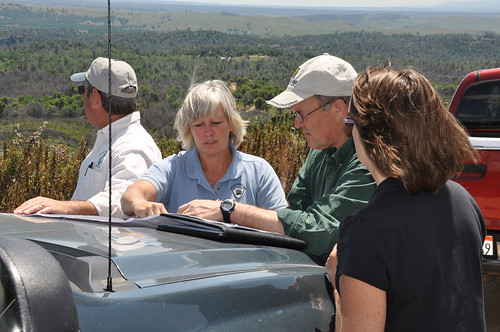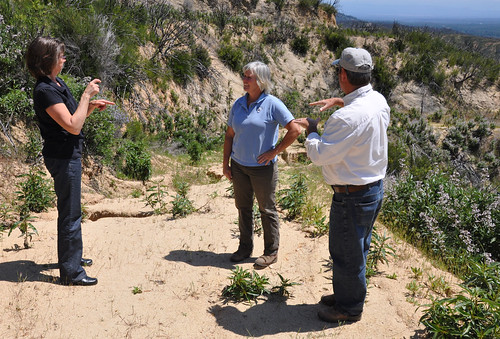
Shasta County landowner Karen Freitas has worked with the staff of USDA’s Natural Resources Conservation Service (NRCS) since 2009, when she sought help recovering from a devastating wild fire that had burned much of her 160-acre tree farm the previous summer.
Helping agricultural producers recover after a natural disaster is fairly routine work for NRCS, and the Redding office, where Freitas went for assistance, was no different. But what was unusual for these NRCS employees is that Freitas is deaf—presenting an unusual opportunity for client assistance.
Freitas approached the Redding NRCS office initially for assistance rebuilding her operation, and District Conservationist Bob Bailey was able to help her put together a conservation plan and an application for cost-share funding through the Environmental Quality Incentives Program (EQIP).
Conservation work implemented under the first contract she signed with NRCS covered water control structures, brush management, critical area plantings, fuel breaks, tree and shrub establishment, forest site preparation, forest stand improvement and access road work. More recently, Freitas has been working with NRCS to develop a forest management plan on her property.

Initially it seemed there might be some communication challenges in working with a hearing-impaired client, especially in some of the more technical aspects of the work. Freitas was the first deaf client NRCS California’s Redding office had ever helped. But the office contracted for professional sign language interpretative services, with excellent results.
Since then, District Conservationist Bailey has used an interpreter several times to facilitate communications between Freitas and NRCS staff during planning meetings and implementation of projects in the field.
“Using an interpreter has worked out great,” Bailey says. “I feel a sense of satisfaction that I was able to assist Mrs. Freitas with her forest management objectives. She is one of the hardest working clients I have, and she takes great satisfaction in the conservation projects she completes.”
NRCS often works with clients to meet their communication needs, relying not only on American Sign Language interpreters, but also interpreters for non-hearing impaired landowners and land managers whose first language is not English.

In addition, USDA has many department-wide provisions to ensure equal access to services for traditionally underserved groups such as women and black farmers, low-income farmers, and Tribes.
Find out more about the Environmental Quality Incentives Program.
Check out more conservation stories on the USDA blog.
Follow NRCS on Twitter.
